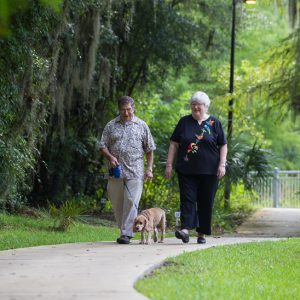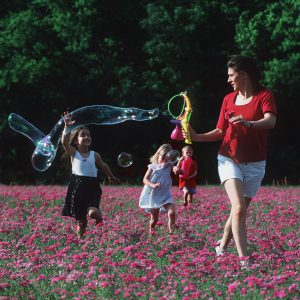
Step by Step into Better Health
What does your morning and evening routine consist of? Now that we are adjusting to our new normal of staying at home and social distancing, many routines are different than before. How about starting a routine of walking 30 minutes or an hour each day? There are so many positive benefits to even just adding 15 minutes to your schedule and most everyone, including children, can do it.

Walking is a great form of exercise that nearly everyone can do. (Photo source: Lyon Duong, UF/IFAS)
Walking improves your mood and reduces stress and anxiety. Who doesn’t need that kind of positive influence in their life right now? If you walk in the morning, it will provide you with energy for the rest of the day and walking in the evening helps you to sleep better at night. Taking a few extra steps each day can add some time to clear your head and add to your energy level while creating a positive mindset for other activities.
One of the other benefits of walking is burning calories. Burning calories may lead to weight loss. It seems that almost every American is always looking for a way to improve the fitness of their body. By exercising during a walk, you build stronger muscles, ligaments and tendons. Physically, walking can reduce your hips, tighten abdominal muscles, strengthen your arms, and tone your legs. Walking gives you a chance to improve balance, coordination and flexibility. Your feet can help to reduce the load on other joints while keeping knee joints healthy and lowering the risk of blood clots. Walking makes your heart stronger and reduces risk of stroke. A research team from the University of Michigan Medical School says that people who are in the 50s-60s age bracket who exercise regularly are 35 percent less likely to die in the next eight years than those who do not. Therefore, some walking each day could help you lead to a longer life.
Now that we have so many reasons to take a stroll each day, we must make sure to walk correctly to avoid injury. It is important to move freely and naturally while swinging your arms to avoid back problems. Keep your shoulder back with your head held high and eyes forward. Position your feet straight and push off with your hind leg to engage your hips. Watch for traffic if you are walking by a highway and of course practice social distancing for now. Maybe later ask a friend to join for a social aspect and to have accountability to someone. Keep a log to track progress. The CDC recommends 150 minutes of moderate activity per week to be considered active adults. That should add up to about 7,000 to 8,000 steps a day but if you can get 10,000, go for it! It is a great time to get into this daily routine and doesn’t require any special equipment or memberships.
So what are you waiting for? There is no better time to start stepping.
For more information on healthy living or other extension related topics, contact your local UF/IFAS Extension Agent.
Additional Resources:
Healthstyle: A Self-Test (UF/IFAS Extension)
Healthy Living: Beating Barriers to Physical Activity (UF/IFAS Extension)
Improving Savings, Health, and Happiness by Modifying How the Family Operates the Home (UF/IFAS Extension)
Walking: Your Steps to Health (Harvard Health)
UF/IFAS Extension is an Equal Opportunity Institution.

